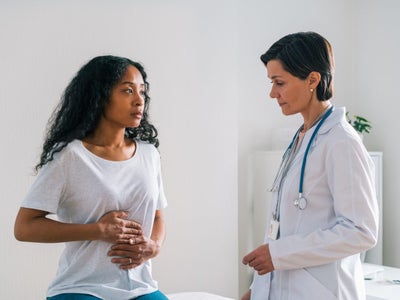
March is Colorectal Cancer Awareness Month. Colorectal cancer occurs in the colon or rectum, a part of the digestive system, also called the gastrointestinal system. According to the American Cancer Society, Black people have the highest colorectal cancer rates of any ethnic group in the United States. We are 20% more likely to get it and 40% more likely to die from it than any other population. Many of our Black luminaries were affected by this form of cancer, from Natalie Desselle-Reid to Eartha Kitt, and the late Chadwick Boseman, who passed at the age of 43 due to the disease.
One may wonder why Black Americans are more likely to get colorectal cancer than other cultural groups. While the reasons for higher risks in Black Americans are complex, they largely reflect the differences in healthcare access due to socioeconomic status. Reports show that people with the lowest socioeconomic status are 40% more likely to be diagnosed with colorectal cancer than those within the highest socioeconomic group.
Aside from socioeconomic status limiting access to proper healthcare, Black Americans are traditionally disproportionately burdened by cancer. A recent study shared that about 224,080 new cancer cases and 73,680 cancer deaths were expected among Black people in 2022. Additionally, the Black community often experiences more significant obstacles to cancer prevention, detection, treatment, and survival, due to systemic racism within the healthcare systems. However, colorectal cancer is treatable in 90% of cases when detected early, but with one in three adults over 50 not up to date with their recommended colorectal cancer screening, we continue to be at great risk.
Adjoa Anyane-Yeboa, MD, MPH, is a physician scientist at Massachusetts General Hospital, specializing in gastroenterology. She is also an early career investigator on the Stand Up to Cancer® (SU2C) Colorectal Cancer Health Equity Dream Team who wants to change these alarming statistics by shining light on this disease with hopes of increasing access to and appointments for colorectal cancer screening in historically marginalized communities. In addition to her research, she works closely with community health centers, local public health departments, and advocacy organizations to increase awareness around colorectal cancer screening in underserved areas.
The SU2C Colorectal Cancer Health Equity Dream Team brings together leading researchers, patient advocates, community leaders and clinicians to improve colorectal cancer screening numbers. In addition to screening, the team’s efforts consist of research, education, and training efforts that extend across three Stand Up to Cancer Zones™ impacted by low rates for preventative testing: Greater Boston, Los Angeles, and the Great Plains Tribal Communities in South Dakota.
Anyane-Yeboa believes there are many misconceptions about colorectal cancer, such as screening qualifications, colonoscopies seemingly being an embarrassing and painful procedure, men only getting the disease, and not having a solution to prevent colorectal cancer, that are in the way of progress. They include the following:
Misconception #1: Only people who have a family history of colon cancer or people with symptoms need to be screened.
The American Cancer Society, SU2C, and the U.S. Preventive Services Task Force recommend routine screening begin at age 45 for people at average risk of colorectal cancer, including those with no symptoms. People of any age with the following symptoms should speak with their medical provider and determine if colorectal cancer screening is appropriate: a change in bowel habits, such as diarrhea, constipation, or narrowing of the stool, that lasts for more than a few days; rectal bleeding; dark stools or blood in the stool; cramping or abdominal pain; weakness and fatigue and unintended weight loss.
Anyane-Yeboa says, “People at a higher risk for colorectal cancer likely need to start screening earlier than age 45 and should speak with their medical provider about their risk and the best screening plan.”
Misconception #2: A colonoscopy is an inconvenient, embarrassing, and painful procedure to undergo.
While stigma and fear around colonoscopies remain, and there can be minor discomfort involved, it’s important to remember that the procedure is very common and painless. “It usually takes only 30 minutes and can save your life! There are also alternative, effective screening tests for colorectal cancer, including tests that can be done in the comfort of your home,” Anyane-Yeboa says. “At-home screening tests involve collecting a small stool sample to check for non-visible blood or DNA that occurs with polyps or cancer. If a person chooses to be screened with a test other than a colonoscopy, any abnormal test results must be followed up with a timely colonoscopy.”
Misconception #3: There is nothing you can do to prevent colorectal cancer.
According to the doctor, colorectal cancer is one of the most preventable cancers with routine screening. It’s beatable in 90% of cases when detected early. Additionally, for those with no family history of it, a healthy lifestyle can reduce the risk for the disease.
Misconception #4: Only men get colorectal cancer.
Unfortunately, colorectal cancer risk is almost as high in women as in men, and symptoms don’t differ significantly. However, some women may mistake colorectal cancer symptoms for menstrual symptoms like premenstrual syndrome or menstrual cramps. Additionally, women’s risk for all cancers (not just colorectal) increases after menopause.
Fortunately for our community, there are solutions. Screening can help prevent colorectal and cervical cancers by detecting and removing precancers in the colon, rectum, and uterine cervix. However, if you are experiencing colorectal cancer symptoms, no matter your age, it’s essential to consult with a healthcare provider.
There are other steps people can take to decrease their risk of colorectal cancer, which include:
Eating a healthy diet: One high in fruits, vegetables, and whole grains and low in red and processed meats has been linked to a lower risk of colorectal cancer.
Staying physically active: Regular exercise can help maintain a healthy body weight and decrease the risk of colorectal cancer.
Limiting alcohol and tobacco consumption: If you consume alcohol in moderation (one drink daily for women and no more than two drinks daily for men) you reduce your risk. As for smoking, quitting should be a top priority.
However, even if you take all of these steps to reduce your risk of colorectal cancer, you cannot eliminate the risk. This is why people 45 years and older should talk to their medical provider, choose a test, and get screened routinely.








